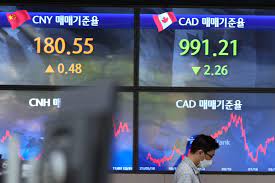Tokyo, May 17: Asian shares were trading mixed on Wednesday as Japan’s benchmark jumped on the news of solid economic growth data, while the rest of the region was mired in uncertainty.
Japan’s benchmark Nikkei 225 gained nearly 0.7 per cent in early trading to 30,039.41.
Australia’s S and P/ASX 200 dipped 0.5 per cent to 7,198.90, after a better-than-expected wage increase report. The wage price index rose 3.7 per cent year on year. But that could mean an interest rate hike in coming months, according to some analysts.
South Korea’s Kospi gained 0.6 per cent to 2,494.20.
Hong Kong’s Hang Seng lost 0.1 per cent to 19,957.89, while the Shanghai Composite was virtually unchanged at 3,291.23.
Japan’s encouraging GDP data released earlier in the day showed consumption was rebounding after COVID-19-related restrictions were eased and borders opened to tourists.
Japan’s economy, the world’s third largest, grew at an annual pace of 1.6 per cent in the quarter through March, according to the Cabinet Office. That was the strongest GDP growth pace since April-June 2022 marked a 1.1 per cent growth. The main negative came from declining exports due to sluggish global demand.
Concerns about the Chinese and United States economies weighed on investor sentiments.
“Recent Chinese economic data pointing to a slower-than-expected recovery, falling short of consensus estimates, are adding to these concerns. Despite some rebound in consumer spending, there are mounting concerns that the bulk of China’s recovery may already be in the rearview mirror,” said Anderson Alves at ActivTrades.
On Wall Street, the S and P 500 fell 26.38 points, or 0.6 per cent, to 4,109.90. The Dow Jones Industrial Average dropped 336.46, or 1 per cent, to 33,012.14, and the Nasdaq composite slipped 22.16, or 0.2 per cent, to 12,343.05.
Energy producers were some of the heaviest weights on the market on Tuesday as Exxon Mobil dropped 2.4 per cent and Chevron fell 2.3 per cent. Home Depot also fell 2.2 per cent after saying its revenue weakened by more in the latest quarter than expected. Other big retailers are scheduled to report their results later this week, including Target and Walmart.
They’re under the microscope because resilient spending by US households has been one of the main positives keeping the economy from sliding into a recession. If it buckles, a recession may be assured. The pressure is on because measures of confidence among shoppers have been on the decline.
Manufacturing and other areas of the economy have already cracked under the weight of much higher interest rates meant to bring down inflation.
A separate report on Tuesday said that spending at US retailers broadly rose last month, but not by as much as economists expected.
“There’s often a gap between how people say they feel and how they spend their money, but the retail sales report shows people are beginning to cut back on big-ticket items and discretionary categories like sporting goods,” said Brian Jacobsen, chief economist at Annex Wealth Management.
Treasury yields in the bond market rose following the reports. The yield on the 10-year Treasury climbed to 3.54 per cent on Tuesday, from 3.51 per cent late on Monday. It helps set rates for mortgages and other important loans.
The two-year Treasury yield, which moves more on expectations for action by the Federal Reserve, rose to 4.07 per cent from 4.01 per cent.
In energy trading, benchmark US crude stood unchanged at USD 70.86 a barrel. Brent crude, the international standard, edged up 2 cents to USD 74.93 a barrel.
In currency trading, the US dollar edged up to 136.52 Japanese yen from 136.36 yen. The euro cost USD 1.0873, up from USD 1.0868. (AP)


